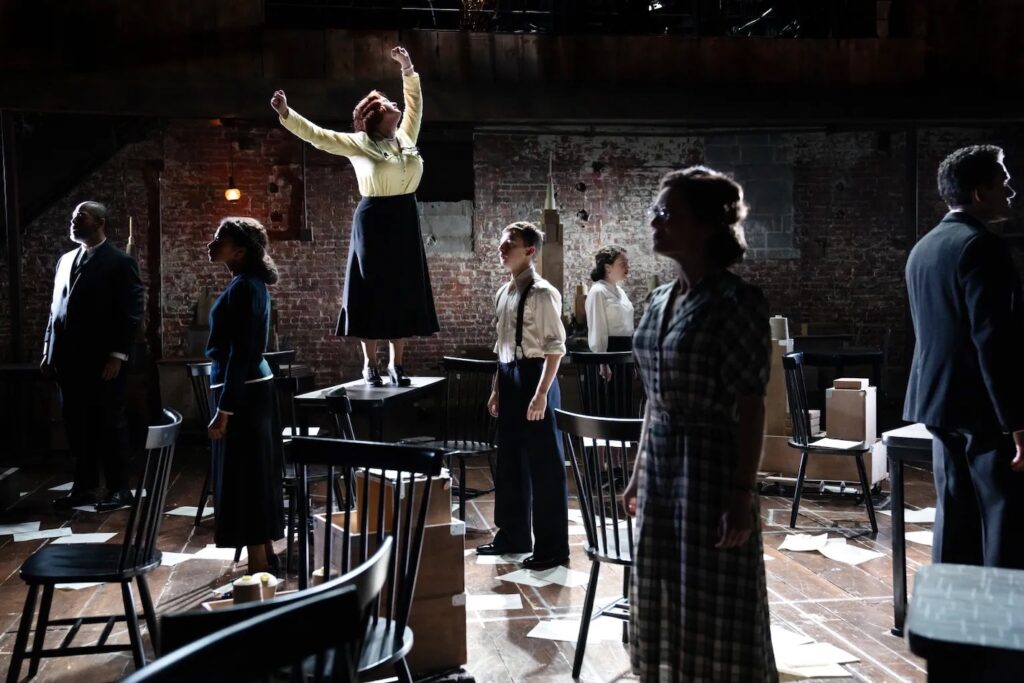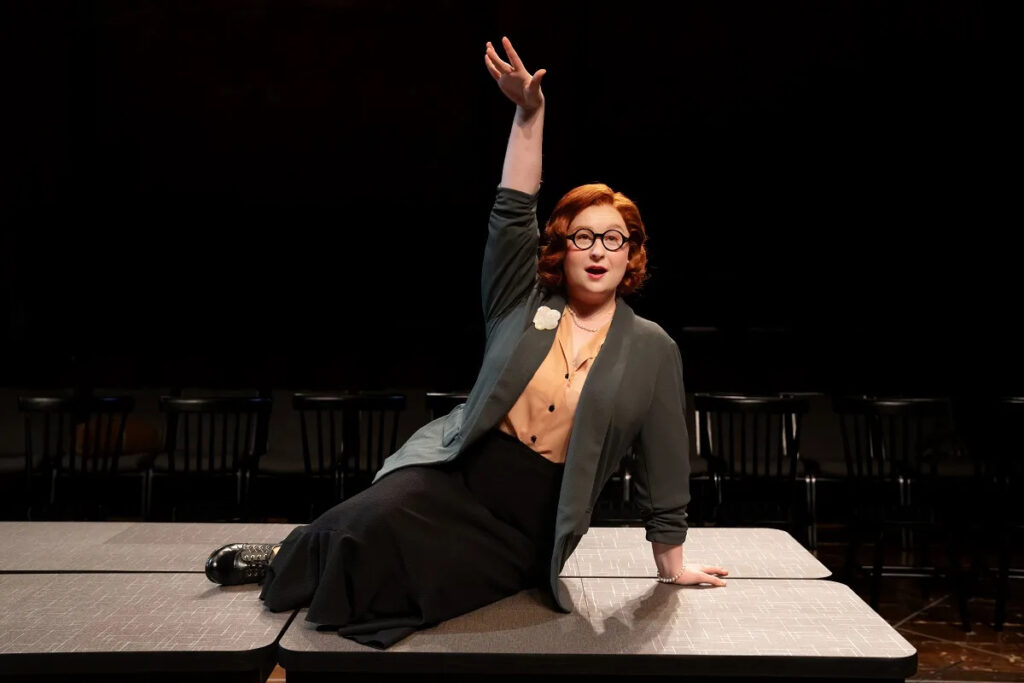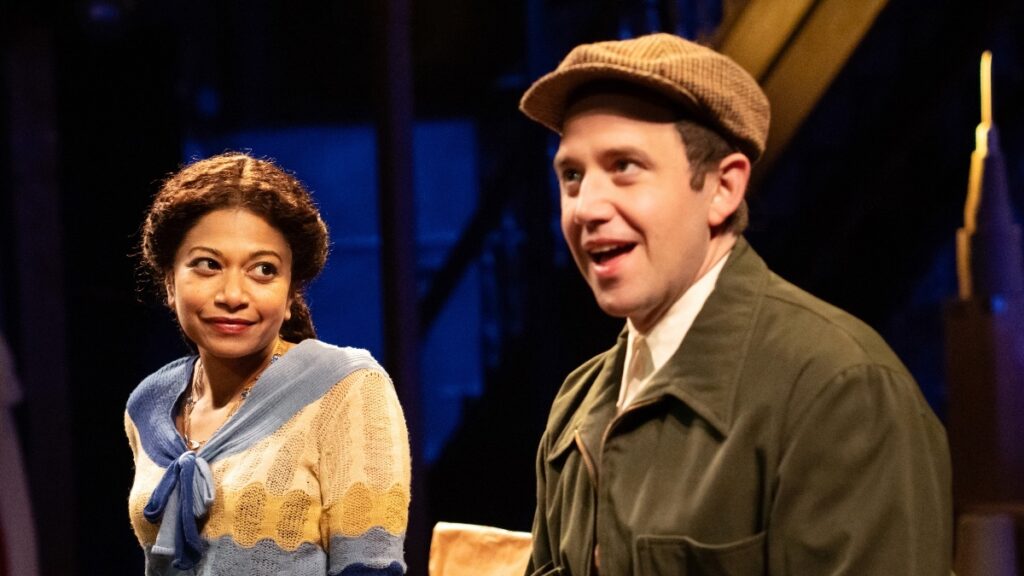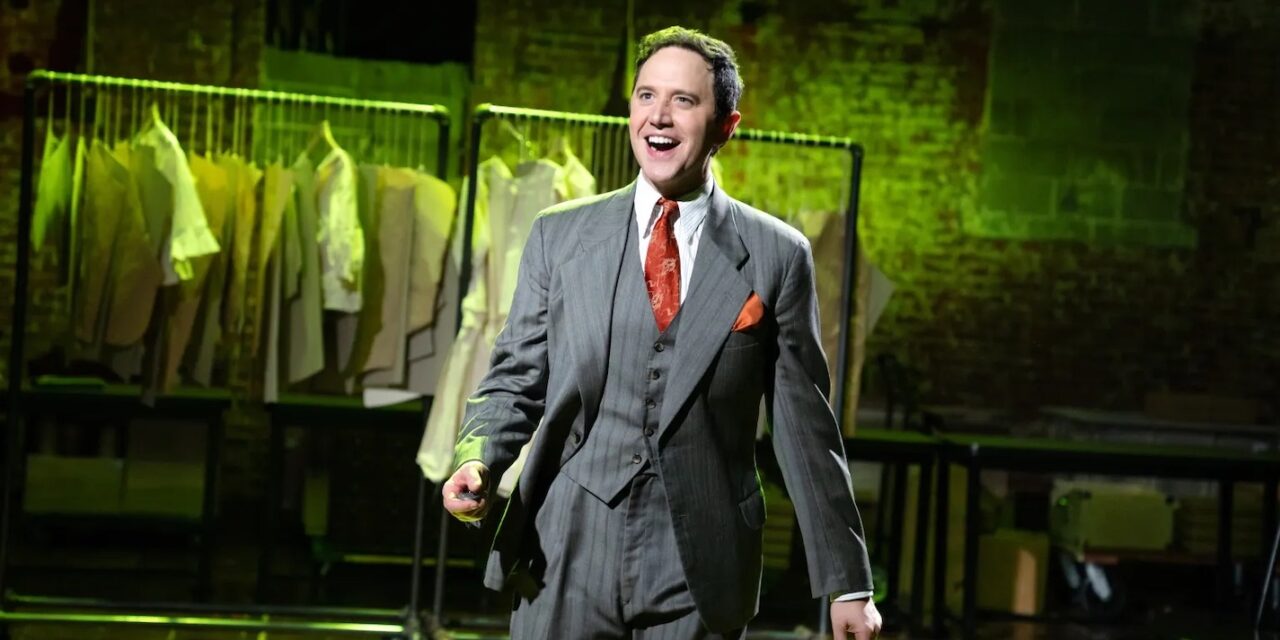Theater Review By Carol Rocamora . . . .
A crosscurrent of compelling themes run fast and deep in the turbulent, terrific revival of I Can Get It For You Wholesale. Directed with ingenuity and flair by Trip Cullman at Classic Stage Company, this 1962 musical (book by Jerome Weidman, music/lyrics by Harold Rome) boasts a passionate ensemble of thirteen actors, a vigorous six-piece orchestra, and a protagonist you’ll absolutely love and loathe at the same time.
Set in 1937 in the garment district of New York, Harry Bogen (the charming Santino Fontana) is a talented, ambitious sociopath who worships money and is determined to succeed at any cost. He leaves victims strewn along his path to success, including his own mother, the woman who loves him, and his business associates, all of whom he double-crosses and betrays on his way to the top. He’s a talented scammer, who enlists two close friends to fork over up $10,000 each to create a partnership for a new clothing line called Apex Modes—while avoiding putting up his own share. He ruthlessly writes checks on the company’s account, lavishing his mother and mistress with furs and jewels, while stocking the runway events with champagne and indulging in fantasy getaway weekends. When he drives Apex Modes into bankruptcy, he manipulates his trusting colleague Meyer to take the fall and go to prison. In the end, instead of falling himself . . . well, you’ll find out.

The revival of this complex work cuts both ways, to use a metaphor appropriate for a play about the clothing industry. On the one hand, it resurrects a relic from American musical theater history—one that catapulted Barbra Streisand to fame in the role of Miss Marmelstein, the loyal assistant of the protagonist. It boasts a catchy score by Harold Rome—folksy, ethnic and with touches of klezmer and undertones of jazz (the six-piece ensemble, perched on the balcony, is terrific). It depicts a colorful era in New York history—the rise of the garment district, elevating Seventh Avenue alongside Broadway in glamor and prominence. It features a loving rewrite of Jerome Weidman’s original book by his son John, attempting to introduce shades of gray into this dark story.
On the other hand (as Tevye would say, two years later), the protagonist evokes a negative stereotype of a nice Mama-loving Jewish boy from the Bronx who morphs into a corrupt con artist Manhattan businessman. This comes at a painful time as we’re witnessing a frightening rise in anti-Semitism of late. Therein lies one of the essential contradictions in a story that features a Jewish anti-hero and at the same time tries to elicit empathy for the plight of hard-working Jews whose professional options were sharply limited in that period of American history.
So what is the merit in bringing this complex, often contradictory work to renewed life? For me, the value of the revival lies in the opportunity it has given its talented director, Trip Cullman, and his gifted design team, to display their ingenious artistry and create an evening of riveting, dynamic theater. Cullman and his scenic designer, Mark Wendland, provide an empty stage filled with tables and chairs that members of the nimble ensemble move about with grace and ease, thanks to Ellenore Scott’s inventive, exuberant choreography.


This minimalist approach allows the superb cast to shine. As Harry’s loving mother, Judy Kuhn gives a moving performance of a parent who recognizes her son’s essential character flaws yet remains devoted. As Ruthie, Harry’s devoted childhood sweetheart, the luminous Rebecca Naomi Jones struggles until she ultimately recognizes his deceit; as does Harry’s partner Teddy (a strong Greg Hildreth). In contrast, the loyal Meyer, Harry’s other partner (an affecting Adam Chanler-Berat), pays dearly for his blind trust. As young Harry, Victor de Paula Rocha dazzles in Scott’s dance sequences, displaying an innocence lost forever (after an anti-Semitic attack). And, as befits a play about the garment industry, the entire cast looks smashing in Anne Hould-Ward’s smart, stylish costumes.
The ensemble delivers Rome’s tuneful score with panache. Winning numbers include: “Momma, Momma,” a memorable mama/son duet; “Who Knows,” Ruthie’s song (reminiscent of “I’ll Know” from Guys & Dolls); “The Sound of Money,” featuring the elegant Joy Woods as Harry’s alluring “lady on the side”; and “Have I Told You lately?” a touching duet between Meyer and his lovely wife Blanche (Sarah Steele). And there’s the fabulous show-stopper “Miss Marmelstein,” sung by the fantastic Julia Lester, who might even match Barbra herself in the role.
As Harry Bogen, Santino Fontana’s charismatic performance is irresistible. Unapologetic in his machinations, and frank in his self-awareness, he takes us into his confidence from the outset with direct addresses and charms us with his mellifluous voice. “You’re either a catcher or a pitcher/You get bamboozled or you get richer,” he sings. Ultimately, we’re the ones who get bamboozled.
Harry takes his place beside other dark portrayals of fascinating, corrupt businessmen in recent theater history, such as Joe Keller in Miller’s All My Sons, Rupert Murdoch in James Graham’s Ink, and the coterie of characters in David Mamet’s Glengarry Glen Ross. Some point out that Harry Bogen is reminiscent of the greatest criminal businessman of our time: Donald Trump. But it doesn’t make the character’s re-emergence more palatable. In the end, Harry Bogen is Jewish—and this is not the best time for Jewish anti-heroes to be on our stages.


The play turns even darker at the end with the return of a character (Mr. Pulvermacher, featuring a sinister Adam Grupper) who states the case for Harry’s behavior—namely, that making money and being successful (whatever it takes) is the best revenge for being persecuted. This dark and cynical point of view muddies the moral waters even further.
However, with John Weidman’s revisions of his father’s book, the ensemble triumphs over the protagonist. In the penultimate song, “What Are They Doing to Us Now,” the entire cast (except Harry) comes together in an anguished cry against anti-Semitism. And in the final tableau, the ensemble sits huddled around a Sabbath table (again, without Harry) in a show of communal solidarity against the corrupt values that Harry represents. They’ve heeded the play’s dark lesson (reminiscent of Kander & Ebb’s Cabaret, returning to Broadway in the spring): “What money makes, money takes away.”
I Can Get It For You Wholesale. Through December 17 at Classic Stage Company (136 East 13th Street, between Third and Fourth Avenues). Two hours, and 30 minutes with one intermission. www.classicstage.org
Photos: Julieta Cervantes


















